Korek Telecom: An Iraqi Telecom with Nationwide Coverage
Korek Telecom is a big player in Iraq with a nationwide coverage. Korek’s market share now stands at 15.7%. The Iraqi telecom operator offers the best quality and price. Also, a year ago Orange and Agility became Korek’s partners, bringing in finance and know-how. Mrs. Gebara also discusses the 3G connection in Iraqi Kurdistan and the story of Korek going IPO.
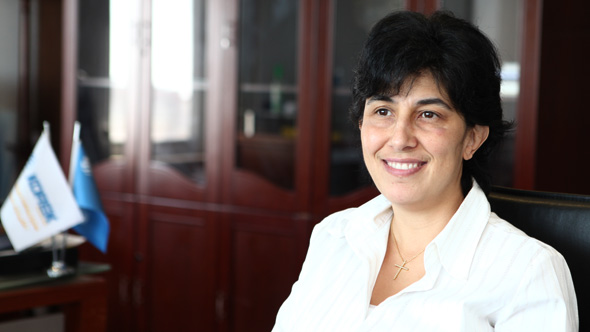
The telecommunications is one of the pillars of the business environment as well as a strong banking infrastructure. What can you tell us about the telecom sector in Kurdistan or Iraq as a whole? I know that Korek Telecom has 75% market share in Kurdistan while in the whole of Iraq it is close to 15%. The government is trying to distribute 3G licenses but it’s a bit mispriced, maybe some companies won’t go for it. What is your perception of the telecom sector?
The telecom environment in Iraq was developed by bits and pieces. During the American occupation licenses were distributed to three operators and they split the country in 3 regions: the north, the centre and the south. Korek came to be because we have been here for 12 years. It was on the request of the local government of Kurdistan (KRG) to offer infrastructure to the country. A lot of people were afraid to go into the business because it’s a big investment. Korek did it, they put personal investment and they succeeded. In 2007 the newly elected government of Iraq decided to launch new licensing that is nationwide and well regulated. At the time they had three operators covering the country: Asiacell, Orascom Iraquna and Zain.
Zain and Asiacell cut their licenses and we took the license of Orascom Iraquna. We launched the operation and we are happy to say we are having very good results. The telecom sector grew from 5% to around 75% penetration in less than 5 years. This is a big achievement bearing in mind that Iraq’s population is very young, 45% of the population is under 15. It means that our penetration compared to the Arab countries where it is 100% or even 110% in Saudi Arabia, is still a good performance.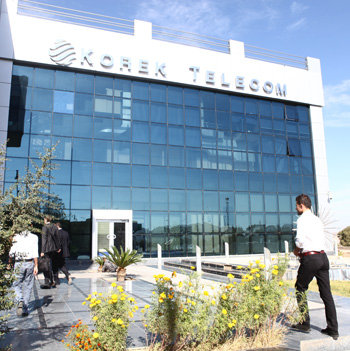
Korek is a big player in Iraq now, we have nationwide coverage. We increased our market share by 4 % in less than a year: we moved from 11 to 15.7%. We offer the best quality and price. We succeeded in another challenge which was to get an international operator to come on board with Korek. A year ago Orange and Agility became Korek’s partners. They bring 2 important things to the table, of course financing but also know-how. Orange is one of the world’s largest operators, so they bring know-how and innovation. Since we started a year ago, we have been increasing our market share drastically; we practically increased our customer base by more than 25%.
The next step is the new generation, we need to bring Iraq to the 21st century. I always like to say that telecom is becoming an infrastructure. It’s not a leisure service like it used to be. In the past we talked about roads, water and electricity and telecom was an accessory. Now telecommunications is more important than roads, electricity and water. A company can buy a generator, can use a four wheel drive car, can use tanks of water, but they can’t replace telecom, be it the phones or the internet because they need it to work. So it’s important to accelerate the bandwidth services in Iraq. To be able to help the economy expand, be it in Kurdistan or the rest of the country, we need to offer those services. To be able to do that, a government decision is needed. Our licenses allow us to use any technology we need, but unfortunately we don’t have enough frequencies to offer good quality services. The bandwidth we have now is not sufficient, we need new frequencies from the government and we need them fast. We also need to liberalise or reduce the cost of fiber optic and bandwidth rent which is huge in Iraq: 100 times more expensive than the surrounding countries. This of course will help accelerate the development that Iraq is experiencing at the moment.
Do you believe that there is the political will to do this?
I know there is political will; unfortunately they need someone who won’t play the political game and will make a firm decision. We were able in less than 5 years to increase phone penetration from 5% to 75% during which time, we were building infrastructure. Now we have the infrastructure, moving on to the next stage will be much faster. We can do in a year what took 5 years to do in phones and voice. We currently have 5% internet penetration in Iraq; this is not acceptable; I am sure we can make it 75% in less than a year.
Korek is a big player in Iraq now, we have nationwide coverage. We increased our market share by 4 % in less than a year: we moved from 11 to 15.7%… A year ago Orange and Agility became Korek’s partners. They bring 2 important things to the table, of course financing but also know-how.
The next question is about your competition. You have advantages: you have a strong partner that is Orange, and you have Agility. Others have Qatar Telecom, which has done a wonderful job with Wataniya: one of the most respected brands when you talk to ordinary people. There is also Zain, a strong player.
How do you stand out from the competition when it comes to providing quality services? I’m sure everybody says they offer the best. What makes you different?
We respect our competition. This is the first rule, if you don’t respect them, you will fail. We don’t take anything for granted. I have said and I will repeat: we have the best quality network. Nowadays the client does not just need to talk, that is a given, it’s like if you go to buy a car and they tell you that the wheels are an accessory. The basic service is to have good quality when you are talking. Korek guarantees this everywhere all over the Iraqi territory, all our clients know this. They are doing more publicity on this than we can do through media.
Secondly, we need to be innovative, we are doing that and we are credible, we never promise something we can’t deliver, we need to be honest with our client. We don’t just say beautiful things and when the client uses the service they realise it is not true. We don’t overpromise, we say and we deliver. Of course at the end of the day the client wants to pay the right price for the right service. Korek offers this package.
Every one of us can say whatever he wants, but the figures show the true picture of what is happening.
One of the major differentia is the brand; I don’t know if this is the case in Iraq where Iraqis like to associate themselves with a brand?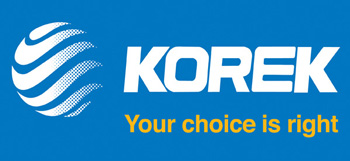
Everybody does. We are the only Iraqi company, Zain is Kuwaiti. We know that Iraqis are proud people and they have a very long history. They are proud of Korek, of a local company that became so big that it can challenge international companies and win. Whether in Kurdistan or the rest of Iraq, everyone is proud of Korek. We are a small Iraqi company and have made it internationally. We are playing in the major league.
Do you see the way to international expansion one day?
We are already international now that we are part of the Orange family. But we are still an Iraqi company with a majority of local shareholders.
Do you feel these shareholders might in the future want to go abroad?
Anything is possible; I can’t know what the future will bring. At the moment we are concentrating on Iraq, to become number one.
What sort of associations does Korek have with people in Iraq? How are their feelings towards Korek different from their feelings towards the competitors, in terms of quality and reliability?
The feedback that we have from our clients or the people around our clients, is that for them Korek is an Iraqi company, a respected company that doesn’t lie or steal. They are proud of it, and feel it offers good quality services. I am very happy about that.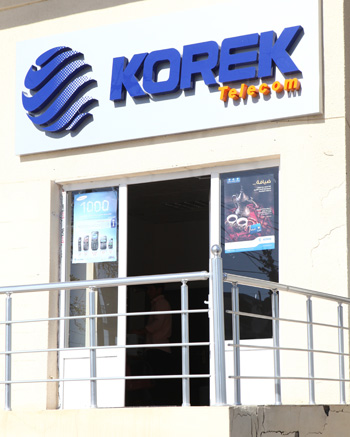
How do you approach corporate responsibility? Obviously this is of great importance for all telecom companies, in fact for any company. You are the Iraqi brand, an investor, the telephone companies are one of the largest investors along with the banks.
We are part of this country. We exist because we provide a service for the Iraqis which they like. They are our clients and part of our family. Our success is due to their participation. It’s normal to give back to the society that is allowing us to prosper. It is normal on a personal level and on a company level. I have always encouraged it and we are very active in this domain.
We came about as a social service. We founded this company because we wanted to give a service to our country that was not there and that no one wanted to put forward the money for it. This is recognised around Iraq.
For example last week, we did a lot of activity with the Syrian refugees, and also in Bagdad and Basra for Eid, we did activities for families and children that couldn’t afford to have a nice Eid, which is a very important occasion for children. We were able to bring them joy, to forget for a while what they are living through, whether they are refugees coming to the north of Iraq, or poor families in Bagdad, Basra, Ashraf or Karbala. We are always present and we have an activity almost every month, in all regions of Iraq. Sometimes we talk about it, sometimes we don’t, it depends, with whom and how. It’s not only the company, it’s the employees, we are all involved, because we are part of this country and we need to give something back.
What about the two business questions. The 3G license…
It’s not a license; we already have a license to be an operator in Iraq.
We have the authorisation to do 3G, our license allows us to do it. The issue is that we need more bandwidth and to have that we need more frequencies. So we need the CMC, which is the regulatory authority in Iraq, to give us more frequencies. Unfortunately most of our 900 frequencies are polluted. If they can clean them for us, we can use them. If they can’t, they need to give us other frequencies to do it. So they need to make a decision.
What about the rumours on the high cost of these licences?
.The basic service is to have good quality when you are talking. Korek guarantees this everywhere all over the Iraqi territory, all our clients know this. They are doing more publicity on this than we can do through media.
Look, at the end of the day we need a strategy, the government needs to make a decision. There are two possibilities, either the price goes up greatly which I don’t see happening, because it doesn’t make any economic sense. It might happen very slowly, perhaps in 7 years we will have broadband if we give the money for the frequencies, but there won’t be enough for the equipment. It will have to come at a very high price, but with no penetration therefore a deluxe service for just a few. Or if the strategy is to develop the country, accelerate the development of the economy and have fast penetration of broadband, then the price should be low if not non-existent.
In all cases, if we compare with the rest of the region, I like to use the example of Morocco because we have more or less the same population and GDP. Of course, they have a better infrastructure and DSL to the house which is an advantage over us. Yet in 2007 we paid US $1.25 billion for the license while in Morocco they paid US $1.3 billion if I’m not mistaken. Recently Morocco gave the 3G frequencies for free and extend the license duration for US $30 million. The US $30 million was paid to expand the license – not for the 3G allocation. They acknowledged that they had over-priced the 2G license and if they wanted to offer 3G, it would have to be for free to allow faster investment and penetration. If you compare the cost of the license here with the rest of the region, it is at least 25% higher and sometimes 100% higher in Iraq. We need to acknowledge we paid US $1.25 billion and we share 18% of our revenue with the government. The government in conclusion owns 35% of the operator. The bottom line is we are partnered with the government.
What about the IPO listing of Korek Telecom on the stock exchange? How is it progressing?
I like to think that I’m an intelligent person. But this is a trick that I don’t understand; do you know the story of the egg and the chicken? This IPO is the story of the egg and the chicken. We are requested to go IPO. To be IPO we need to change the profile of the company from private to participant. To be able to do this we need the clearance from the tax authority. They are refusing to give the clearance, because they say we need to change our payment tax from here to Bagdad. We have been listed in this region for 11 years; we are paying all our tax within the federation. The law says that you can pay wherever you are. So there is a government issue that needs to be resolved between the contradictions on the tax, the license, Iraqi law, stock exchange law etc. Something needs to change so that we can go IPO. So beating us with a stick to go IPO is not going to happen if they don’t solve the issue! So we will have to just get used to the beating!
It’s the story of the egg and the chicken and I honestly don’t understand.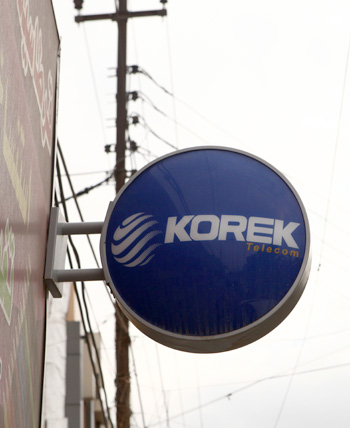
Well lastly, let’s speak about something more general and more positive. You are a foreigner at the head of an Iraqi company. What are some of the challenges and what would you like to be improved?
It is challenging, I’m not a person that likes to be bored. I have no risk of getting bored in my job. It’s a beautiful country, we are an Iraqi company and we are proud of it. 99% of the employees are Iraqi and they built this company and we continue to evolve together. Iraq and Kurdistan are booming, it is easy to invest here.
Unfortunately there are two issues that we are facing: finding resources and retaining them. We don’t have the know-how to keep up with the rate of business development. We have to remember Iraq has been in war for a while, the country has lost a lot of know-how. The new generation also lived in war so they lost a lot of know-how because they were practically in an embargo, cut off from the world. We find it difficult to find and keep resources because of high demand. I also know that the government is working on changing the law. As you know it was a socialist country; there were no private companies, the government used to own everything. We need new laws to take into account that we now have a private sector. I will give an example, as a company we pay and our employees pay social security. So we contribute and the employees contribute, but they don’t have social security, only government employees do. We pay but we don’t receive it. These things need to be fixed so we can attract more people and they feel that they can have a better career and future in the private sector than they do with the government.
It’s a beautiful country. A lot of effort was made by the government to facilitate investment; we have one of the best investment laws in the Middle East. You don’t have to have a local partner, you doesn’t take a year to create a company, you can do it in a week and start work. This is excellent.
You can go to Dubai and establish yourself in a free zone and you don’t need to have a local partner.
It’s not completely true. I like Dubai but at the end of the day it’s like how I imagine in the future when you go to Mars and you put people from all countries in a ship, they become a new country. Dubai is like that for me: foreigners catering for foreigners. Here we have 30 million people. The economy is theirs and they are developing it, with the help of foreign investment. It’s not like a free zone where everybody comes to do business for everybody else.
Is there anything else you would like to say to contribute to the report?
What I can say is that Iraq is open for business, Kurdistan especially. I encourage everybody to come and see. There is a place for everybody.